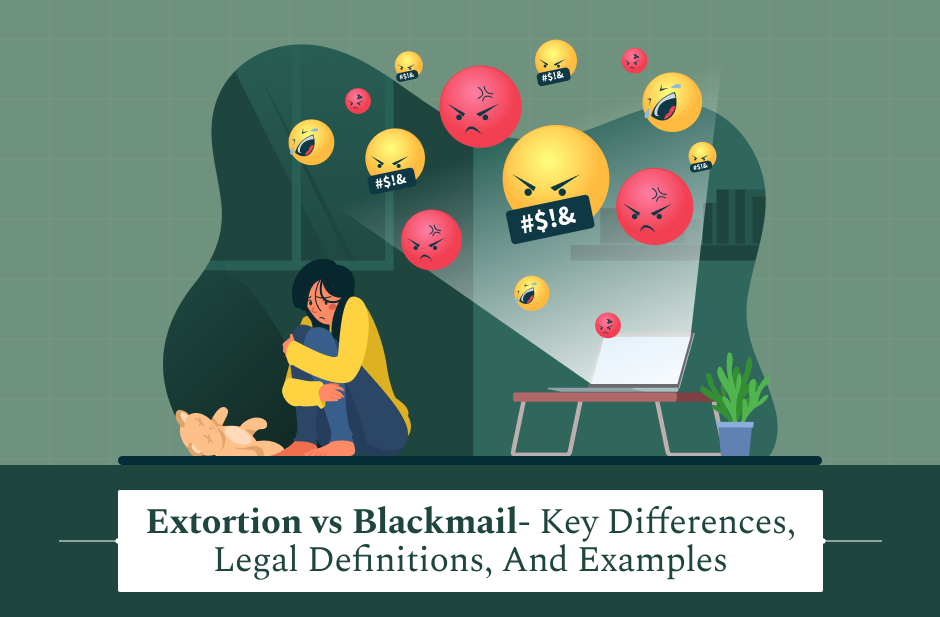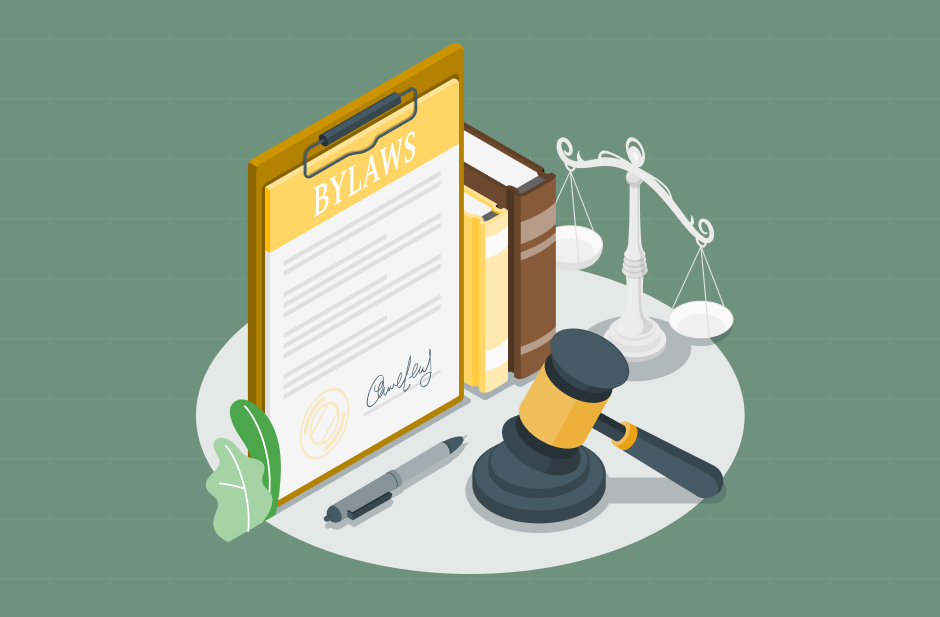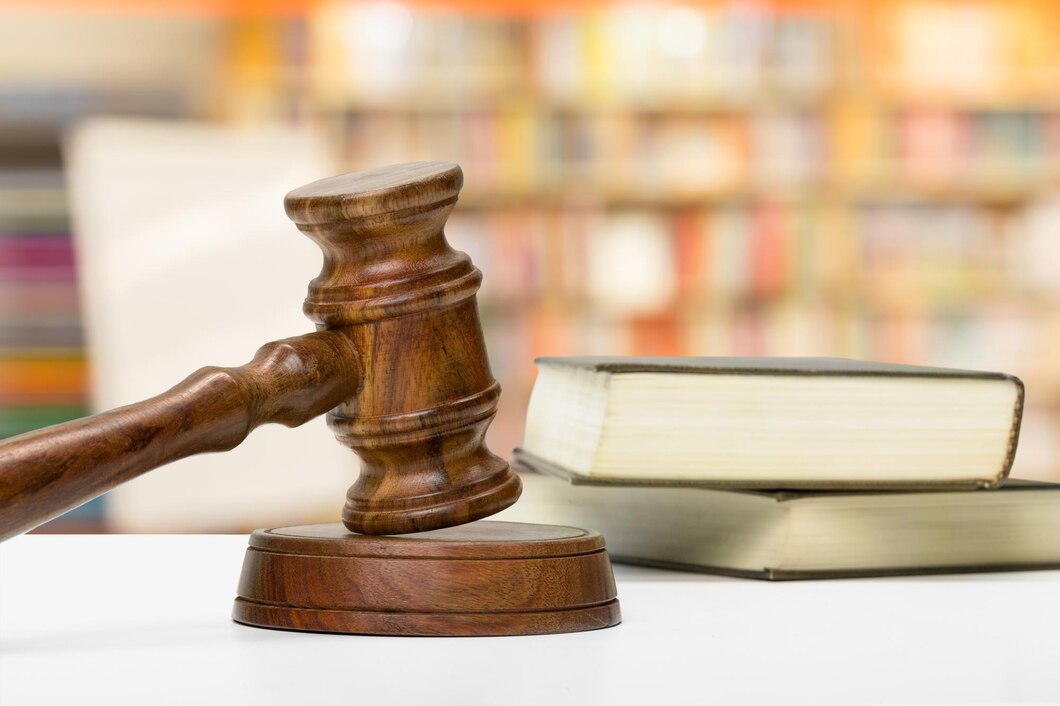When people hear “trial,” they often imagine a jury of peers deliberating, but in many legal systems, there is another option: a trial decided solely by a judge. This is called a bench trial.
For defendants, plaintiffs, lawyers, and the public, knowing what a bench trial involves—its advantages, downsides, when it’s used, and how it compares to a jury trial—is critical.
In this article, I will explain the following things:
- What is a bench trial?
- What are the different types of bench trials?
- Key aspects or elements of a bench trial.
- Legal impacts of a bench trial.
Additionally, I will also explain some of the most common questions that people also ask about a bench trial. So, if these are some fo the things that you want to know, keep on reading till the end…
What Is A Bench Trial?
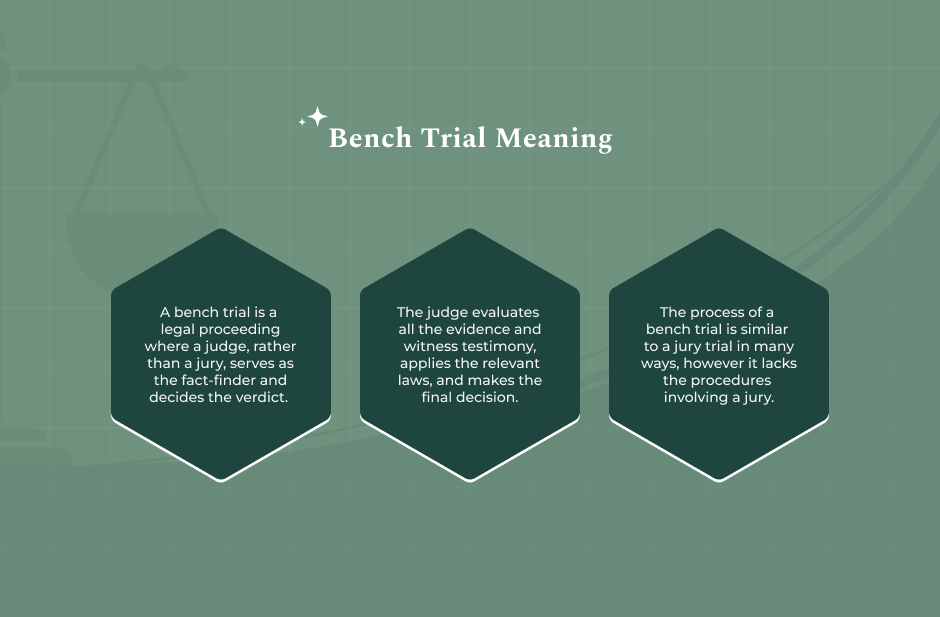
A bench trial (also called a judge trial or non-jury trial) is a legal proceeding in which the judge serves as both the finder of fact and the interpreter and applicator of law. That is, in a bench trial, there is no jury.
In such a trial, the judge is the sole person responsible for doing the following things:
- Hearing the evidence.
- Assessing the credibility of testimony.
- Ruling on objections.
- Determining what facts are proven.
- Applying the law.
- Issuing a verdict or decision.
According to the legal definition that is provided by the Legal Information Institute of Cornell Law School, a bench trial is basically the “type of trial that does not involve a jury but is conducted by the judge alone, in which the judge both decides the facts of the case and applies the law.”
Contrary to what most people might think, the bench in this legal term refers to the judge who is holding the trial. Hence, the term “bench trial” in its entirety means a trial by the judges.
Express Legal Funding explains that these trials are rather common in the following types of cases:
- Civil cases.
- Smaller claims.
- Administrative hearings.
- Family law matters.
Additionally, these trials are also common in certain kinds of criminal cases, especially when both parties agree to waive the right to a jury.
What Are The Types Of Bench Trials?
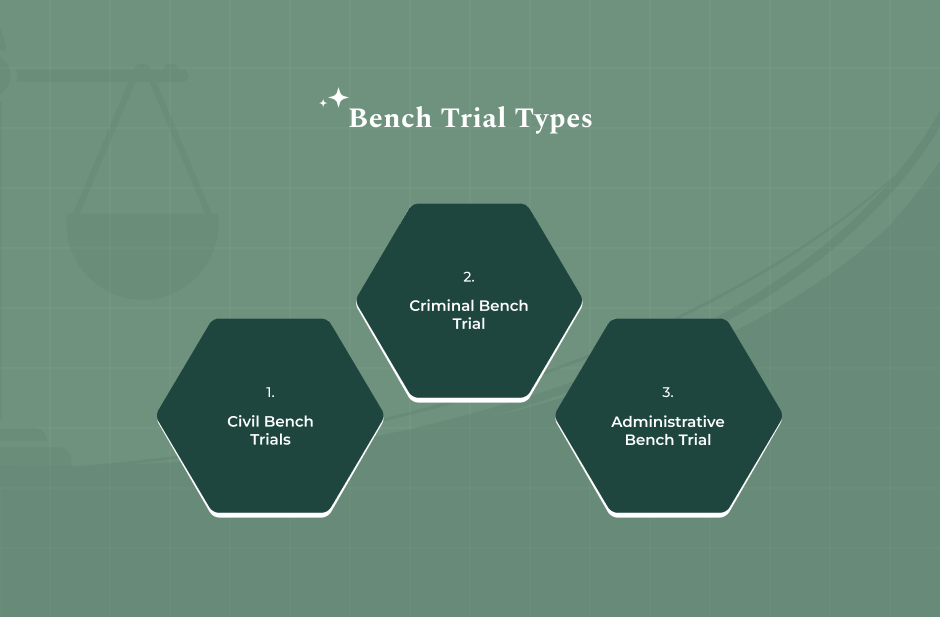
Bench trials can be categorized in different ways depending on the area of law (civil vs criminal), the level of court, and whether the bench is a single judge or a panel of judges. Here are the types or variants:
1. Civil Bench Trials
Disputes between private parties (contracts, torts, property, etc.). Many civil courts offer bench trials either by default or upon election.
These types of bench trials are also used in certain legal trials where jury trials may not be available. These include:
- Family law.
- Probate.
- Small claims.
- Other specialized courts.
2. Criminal Bench Trials
Certain misdemeanors or less serious criminal charges may allow bench trials. In more serious criminal cases, bench trials may be possible if the defendant knowingly and voluntarily waives the right to a jury trial.
3. Administrative Or Specialized Bench Proceedings
Regulatory, licensing, immigration, or other quasi-judicial matters often use bench trials or hearings. Certain cases also include summary offences (low-level offences), which often do not involve juries.
4. Panel Of Judges / Division Bench Trials
Sometimes more than one judge sits (a “division bench” in some jurisdictions), especially for appellate or particularly complex cases, though that is different from a jury bench trial. However, in bench trials, even with multiple judges, there is no lay jury.
5. Hybrid Or Partial Bench Trial Features
There are processes where factual stipulations reduce what a judge needs to decide. This can also happen in jurisdictions where the judge handles most issues, but some jury involvement remains on limited questions. But strictly speaking, a bench trial means the judge alone decides.
What Are The Key Aspects Of A Bench Trial?
Here are the main legal and practical features that define bench trials:
1. Right To Jury Vs Waiver
In most criminal justice systems (e.g., the U.S.), a defendant is given a choice between a jury trial and a bench trial, and a jury trial is their right, strictly speaking.
As a result, they are able to surrender that power and opt for a bench trial, but it has to be a well-informed, voluntary, and usually court-approved gesture that might also need the prosecutor’s consent.
It should be noted that in civil proceedings, the option for a bench trial is open not only to the judge but also to the parties, subject to the jurisdictional rules.
2. Standard Of Proof And Rules Of Evidence
The rules of evidence and the procedure during a bench trial are similar to those implemented in a jury trial.
The burden of proof (e.g., “beyond a reasonable doubt” in criminal cases) is also the same. Moreover, the judge, like the jury members, receives arguments, decides on the admissibility of evidence, and hears objections.
3. Efficiency And Cost
It is worth mentioning that bench trials are usually quicker and less costly: no jury selection, no jury instructions, no deliberation period. Sometimes, more informal steps are taken and fewer delays occur.
4. Predictability And Neutrality
A judge, being legally trained, may be less swayed by emotional appeals, the “drama” of witness presentation, or rhetorical elements that can influence juries. This can make legal reasoning more central.
Also, in high-profile or publicity-heavy cases, opting for a bench trial can reduce the risk of jury bias, preconception, or media influence.
5. Risk Concentration
Because one person (the judge) decides everything, all risk is concentrated: if the judge is unfavorable to certain types of evidence or arguments, or has particular judicial philosophies, that may weigh heavily. Additionally, there’s less chance for “hung jury” or jury nullification (jury refusing to convict despite evidence).
6. Appeals & Record
Bench trial decisions are subject to appellate review. In many jurisdictions, findings of fact by a judge are given more deference on appeal than jury findings (though this can vary).
The legal record (motions, objections, rulings) remains crucial; the judge’s written decisions are often more detailed.
Read Also: What Is An Alford Plea: Legal Definition & Meaning
How Does A Bench Trial Happen?
Here is a typical process/steps in a bench trial (criminal or civil), showing how it unfolds:
1. Pretrial Phase: First comes the pretrial phase. According to egattorneys.com, in this step, the parties prepare for the phases, such as:
- Discovery.
- Exchange of evidence.
- Legal motions.
Additionally, they discuss whether to waive a jury trial. For instance, in criminal cases, the defendant (and often the prosecution and judge) must agree to a formal waiver in writing or on record.
2. Scheduling and Setting: Second, the scheduling takes place. Bench trial dates set. In civil, family, or small claims courts, the scheduling is often simpler since no need to line up a jury. Additionally, pretrial conferences can be held to clarify issues, potentially narrowing the facts or legal questions.
3. Trial Opening / Pleadings: Opening statements (or summaries) may be made. Depending on the jurisdiction, it could be less formal.
4. Presentation of Evidence: Witness testimony, cross-examination, documentary evidence, exhibits, etc. Objections are made; the judge rules on admissibility. Judge observes demeanor, weighs credibility.
5. Legal Arguments / Motions: Motions may be raised during trial—e.g. motion to dismiss, motion for judgment as a matter of law.
6. Closing Arguments: Each side summarizes the evidence and legal arguments.
7. Judge’s Findings and Verdict / Judgment: Judge deliberates (sometimes immediately) and issues findings of fact and conclusions of law. Then, it delivers a verdict (civil or criminal) or judgment.
8. Post-trial Motions, Appeal: After the verdict, parties may request to set aside the verdict, for a new trial (depending on the law) or directly go to the appellate court. Bench trial verdicts can be appealed on grounds such as errors in law, insufficient evidence, due process violations, etc.
What Are The Legal Impact Of A Bench Trial?
The choice and conduct of a bench trial have several legal consequences, both for the immediate parties and the wider legal system:
- Effect on Rights and Protections: Waiving a jury trial must preserve constitutional protections; Courts often require that the defendant understand the rights being given up. According to the Kansas Law Review, if the waiver is invalid (involuntary, not voluntary), the verdict may be overturned.
- Speed and Finality: The use of bench trials accelerates the process; there are minimal peripheral delays. The quicker resolution results in lower legal costs and less strain on the courts.
- Strategic Legal Consequences: It might be beneficial to select a bench trial as an option if the case is based on technical and intricate legal justifications, complex rules of evidence, and the case is primarily on legal interpretations rather than facts. Conversely, the loss of “jury sympathy” or emotional appeal, the judge might be even more stringent, or he might follow legal rules more tightly.
- Transparency and Public Perception: The general public is more accustomed to jury trials; bench trials are sometimes viewed as less transparent. Some might see bench trials as less democratic due to the decision coming from one judge only.
- Precedent & Legal Development: The judge in a bench trial, whose decision may be more powerful in giving a legal precedent-setting (especially in the case of documented judgments) made the findings.
- Appeals Considerations: Finally, because the judges’ findings of fact become the basis for which deference is given, it is thus more difficult to overturn the factual findings in an appeal; only errors in law are highly scrutinized.
Read Also: What Is A Bail Bond: Legal Definition & Meaning
Frequently Asked Questions (FAQs):
Now that you are aware of what is a bench trial, here are some of the questions that people also ask when they want to know more about this. Take a look at them before you leave:
No. It depends on the jurisdiction and the type of case. In criminal cases, the defendant must often waive the right to a jury trial in a knowing, voluntary manner. Sometimes, the prosecution or the court must consent. Certain charges (especially serious crimes) may have mandatory jury trial requirements.
Several reasons: speed, lower cost, more predictable legal reasoning, technical legal issues, cases where emotional appeal might harm more than help, or when publicity or bias could influence a jury.
Usually yes. Without the time required for jury selection, jury instructions, and jury deliberation, bench trials tend to be shorter in schedule and in court time.
Yes. The parties can appeal bench trial decisions on legal grounds (errors in law), or where facts are manifestly unsupported by the evidence. However, factual findings by judges are often given greater deference on appeal.














